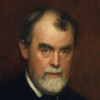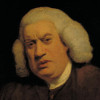“ to see men, we must see their works, that we may learn what reason has dictated or passion has excited, and find what are the most powerful motives of action. To judge rightly of the present, we must oppose it to the past; for all judgment is comparative, and of the future nothing can be known. The truth is that no mind is much employed upon the present ”
Samuel Johnson, The History of Rasselas, Prince of Abissinia (1759). copy citation
| Author | Samuel Johnson |
|---|---|
| Source | The History of Rasselas, Prince of Abissinia |
| Topic | action passion |
| Date | 1759 |
| Language | English |
| Reference | |
| Note | |
| Weblink | http://www.gutenberg.org/files/652/652-h/652-h.htm |
Context
“What have I to do with the heroes or the monuments of ancient times—with times which can never return, and heroes whose form of life was different from all that the present condition of mankind requires or allows?”
“To know anything,” returned the poet, “we must know its effects; to see men, we must see their works, that we may learn what reason has dictated or passion has excited, and find what are the most powerful motives of action. To judge rightly of the present, we must oppose it to the past; for all judgment is comparative, and of the future nothing can be known. The truth is that no mind is much employed upon the present; recollection and anticipation fill up almost all our moments. Our passions are joy and grief, love and hatred, hope and fear. Of joy and grief, the past is the object, and the future of hope and fear;”
source



